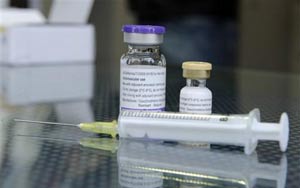|
 US scientists think they're on track to develop a 'universal' vaccine that will protect people against all kinds of influenza. |
The standard flu vaccine causes the body to produces antibodies, which target parts of the virus that frequently mutate. But in a new study, researchers used a vaccine aimed at a different part of the virus.
Gary Nabel heads the US government's Vaccine Research Center at the National Institutes of Health and was the study's lead author: "There are parts of the flu virus that could be the target of what we would hope eventually could be a universal influenza vaccine. They don't mutate, and the reason they don't mutate is that if they try to, the virus can't survive if you have mutations in these sites."
To get at these non-mutating parts of the virus, Nabel and his colleagues used a two-step vaccination process, called "prime-boost." The first step uses a bit of influenza DNA to get the patient's immune system to begin fighting off the flu, and then the protection is given a "boost" some time later by the second step, which can be either another bit of DNA or a conventional flu vaccine.
In his paper, which was published online by the journal Science, Nabel describes the results of animal tests in ferrets and mice using the 1999 vaccine for the boost.
"The antibodies that we were able to elicit could neutralize [varieties of flu virus] as far back as 1934 and as recently as 2007. So it really gave a broad coverage against a range of seasonal viruses that wouldn't be covered by the traditional flu vaccine," he said.
Preliminary phase one tests of this new type of flu vaccine have already started in humans, but in an interview, Nabel said that even if all goes well, it will still be years before a universal flu vaccine is widely available.
"It's certainly not going to be with us in anything less than three years, and I think it's more likely that we're in a five to ten year time frame."
Gary Nabel of the US Vaccine Research Center points out that his universal flu vaccine would have another benefit. A DNA-based vaccine wouldn't have to be grown in chicken eggs, doing away with the time-consuming and finicky manufacturing process of the current flu vaccine.
ferret: a small fierce animal with a long thin body, kept for chasing rabbits from their holes, killing rats, etc.(雪貂)
finicky: needing great care and attention to detail(需認真仔細對待的;需要注意細節(jié)的)
Researchers seek genetic clues to deadly bacterial epidemics
A new AIDS plan for the US, and new hopes for a vaccine
(來源:VOA 編輯:陳丹妮)
